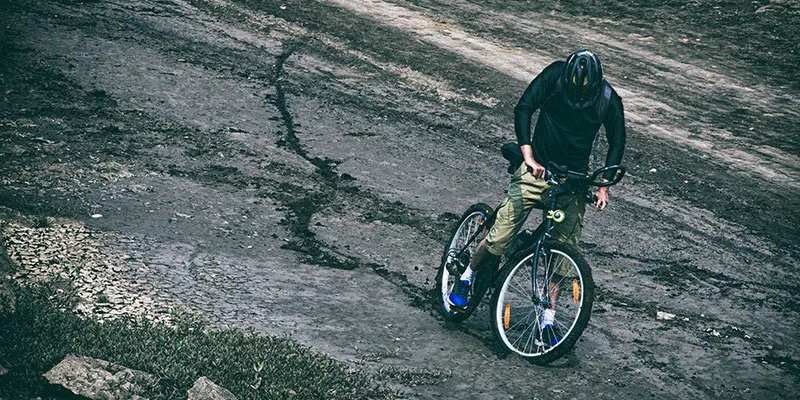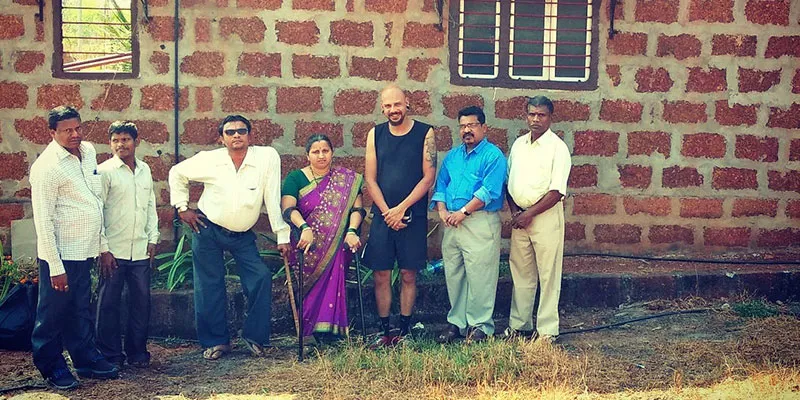Rohan Sabharwal’s 2,100-km cycling expedition across four states to spread mental health awareness
Rohan Sabharwal was feeling depressed for a few weeks. He had trouble sleeping, was having spats with his partner, suffered from mood swings, was following an erratic eating schedule, had issues focusing on work, and was on edge.
After his girlfriend bought a cycle and started going on rides, Rohan decided to follow suit. On the evening of December 7 last year, Rohan, who smokes 20 cigarettes daily, rode out on his gearless Hercules Rocky 2.0 onto the Mumbai roads; he rode 22.5 km before he gasped for breath and made his way home. The next day, he got into the saddle and quickly touched the 25 km mark; though he was tired, he rode on, and finished 50 km that night. The next night, he rode 100 km. He felt exhilarated, and more importantly, for the first time in weeks, he slept soundly.
Cycling had given him a new lease on life.

Having cycled regularly since then, this February, Rohan decided to embark on a 22-day, 2,100-odd km journey from Mumbai to Bengaluru, across four states, to spread awareness on mental illness. His ride was funded by Bombay Berlin Film Productions, an Indo-European film production house, which is producing the feature length documentary on his trip called ‘Spreading Cycology’, and also provided the support vehicle.
Finding a solution for his problems
Rohan, a graduate from London Film School, has had his documentaries nominated and showcased at festivals globally, like The New York International Film and Video Festival and the British Film Festival. But his life has always held a dark secret. For the past two decades, since he was 17 years old, Rohan has been grappling with bipolar disorder, leading to several suicide attempts, hospitalisation, and electroconvulsive therapy.
Despite meeting numerous psychiatrists and trying different therapies, he has continued to suffer from the throes of bipolar disorder, as well as the side effects of his medication, including severe diarrhea. The physical effects, combined with his mania, and crashes, mood swings, and anxiety curbed his professional, social, and love life.
Going off medication, meanwhile, meant that he had to fight the demons on his own.
But while on the road, he came in contact with Dr P.V. Bhandary, the Medical Director and Psychiatrist of Dr. A.V. Baliga Memorial Hospital, Doddanagudde, Udupi, and the meeting made a big impression on him.
As soon as Rohan and his team reached Udupi, they were told by everyone -- from the owner of the lodge they were staying at to the caretaker of a home for the aged that they met along the way -- that if they were interested in mental health, they should talk to Dr. Bhandary. “He is something of a mental health maverick who has set up a mobile unit with four vans that services the surrounding areas. He organises and participates in community outreach programmes and gives talks on some pertinent issues on an almost daily basis. He even gave me a mini-consultation and some advice on my own condition. Even though I met him for a few hours, I connected with him, and I was more accepting of the fact that medication could really benefit me,” says Rohan.
Rohan had been considering going back on medication for a while now, and Dr. Bhandary put things in perspective. This was especially true when he identified that Rohan might currently be manic (the manic phase of bipolar disorder is characterised by feelings of heightened energy, creativity, hyperactivity, delusions of grandiosity, and euphoria) and may have to be careful, considering the expedition involved a bit of danger, both physical and mental.
Four states, 2,000 km, and many stories
Rohan had watched a YouTube video a few days before his expedition began. It talked about the Ratnagiri Manorognalaya (Mental Hospital) not having a single psychiatrist. Thankfully, on reaching Ratnagiri, Rohan and his team found that there were now two psychiatrists present at the institution.
An incident that brought home the ignorance in rural areas about mental health took place after he had stopped off at a small restaurant after getting off the ferry in Jaigarh. A boy with microcephaly (abnormal smallness of the head, a congenital condition associated with incomplete brain development) came in and was generally curious about Rohan’s piercings and tried touching his shaved head. He noticed that the person running the restaurant was a bit uncomfortable that he was doing this to a customer and tried explaining to Rohan that there was something wrong with the boy.
“I said that I knew what the problem was, and requested them to not worry about him being curious and let him do what he wanted. But they insisted on making him apologise and told him to hold his ears and say sorry,” says Rohan.
Rohan confronted this act by asking them to not behave in such a manner, and invited the boy to sit and talk to him. “It’s not his fault or their fault. His brain is not completely developed, and in many rural areas, as in this case, they didn’t even know what his condition was called. This is exactly how life is for people with mental defects and disorders in India. It’s ridden with stigma, lack of education, and poor access to mental health care. After we were done, we saw him trying to play with some other kids who had a laptop, but they chased him away, and we later saw his mother pulling him away. She was frustrated, not just with him, but also with the people around,” says Rohan.
From Mumbai to Goa, Karnataka, and Kerala
Pedalling across four states, Rohan observed that each state had its own problems. In Maharashtra, he saw a lot of poverty and really bad infrastructure. He felt that coastal Maharashtra was a rider’s nightmare and had by far the worst roads when compared to the other states. There were other infrastructural problems as well; water and electricity shortages were extreme, with people forced to have water drums in every room.
All of that changed almost immediately when they entered Goa. The roads became better, and the people seemed better off, happier, and friendlier. They stopped by ‘COOJ’ (Cause of Our Joy), a daycare centre doing work in the field of schizophrenia and mood disorders. “They are located in a beautiful Goan bungalow with big windows and a nice garden, and as we drove around looking for parking, we heard people singing ‘Country Roads’ at the top of their voices. This could have been just about any Goan party. We soon realised, however, that this was coming from COOJ. I walked in only to discover that this was the first time I was entering any mental health-related centre that didn’t make me claustrophobic,” says Rohan.
Even the halfway homes and mental health rehabs that Rohan had visited prior to this (and been in) made him feel choked, even though they weren’t as bad as the hospitals. But COOJ, in contrast, was like a sweet old lady’s home. They had a range of activities, including karaoke, and have yearly elections for the patients, who get to choose their president and vice-president.
Coastal Karnataka again had many mental health centres, and people felt a bit more free discussing mental health when compared to the other states. This, Rohan observed, could probably be due to the impact of organisations like National Institute of Mental Health and Neurosciences (NIMHANS), Dharwad Institute of Mental Health and Neurosciences (DIMHANS), and hospitals in cities like Manipal and Mangalore distributed across the state.

Kerala was the strangest experience for Rohan and his crew. Having flown into Cochin, his experience with Kerala prior to this trip was always good. He expected a lot more of the state, especially given its high literacy levels. “Entering Kerala by road and riding through the state, I promise, will change anyone’s impression. Towns are congested, there is some political rally or speech every single evening in every small town. Many people were very suspicious of us, more so than any other state,” says Rohan.
As far as mental health is concerned, they almost only heard anecdotal explanations for the causes of mental illnesses, and ayurvedic remedies are popularly promoted. The cities and bigger towns had some psychiatric centres, but in villages, it was mostly attributed to past life sins and/or our “vital forces” (doshas).
In Kerala, they also visited one organisation called ‘Hrudayaram’, based in Kannur and Iritty and run by nuns, that was doing some good work with teens and adults, both religious and irreligious. They also had mobile vans and told Rohan that they offer counselling without religious motives. They were also the first and only people working in the field that spoke about Kerala’s alcohol problem to Rohan and his team and how the liquor ban wasn’t helping.
A few psychiatrists did, however, tell Rohan that nowadays, a few faith healers have begun recommending that, apart from their analysis and attribution of mental illness, patients seek appropriate medical care. But again, these are few and far between.
Going beyond talking the talk
Moved by what he has seen, Rohan wants to do his bit to give back in whatever way he can. He has in mind a few simple and immediate needs that he can help address, in either his personal capacity or through his network. “I can help with small requirements that I can handle myself, and I have asked NGOs working in the field of disability and mental health to pitch in too. I may not be able to help directly by raising lakhs or crores, but I can make pitches, websites, and work on design or content. So, whatever I, or my friends and colleagues who have decent technical knowledge, can help with, we will help with,” promises Rohan.

Among the causes that Rohan plans to take up are:
- Guhagarh Handicap Association needs help with a crowdfunding plan and a vehicle to transport people with disabilities. Rohan plans to reach out within his networks and try to convince a corporation to donate the vehicle. He also plans on helping them improve their online presence.
- An old age home needs help with their website, and Rohan, who has experience building websites, plans to help them with that.
- Through the social enterprise CraYon Impact, which Rohan and his partner run, he is planning to partner with someone he met in Kochi to organise accessible events around disability and mental health.
The personal impact and the future
The trip has made a huge difference to Rohan’s physical, mental, emotional, and social life. “I feel great. Firstly, my moods have been mostly stable. There were a few moments in the trip where I went into a negative space, but mostly, they were resolved or forgotten about. The fact that I had a lot of work to do, coupled with the physical task of riding 100 km or more every day, didn’t leave much space for anything else,” says Rohan. By evening, he was tired, and slept by 10 pm on most days because he had to be up early. His eating habits also improved.
Finished with his first trip, having gathered stories from more than 20 villages and ridden 2,200 km, he doesn’t want to stop. The next trip will be to Kolkata, traveling through Madhya Pradesh, Chattisgarh, Jharkhand, and West Bengal. After that, he has a third trip planned to Pondicherry via Telangana and Andhra Pradesh. His last trip for 2017 will be to Punjab, for which he plans stops in Gujarat, Rajasthan, and Haryana.
In 2017, Spreading Cycology will gather stories from 100 towns and villages and travel 10,000 km. The four trips will be coalesced into a 70-minute documentary film and be released as a web-series of 10-15 weekly episodes.







